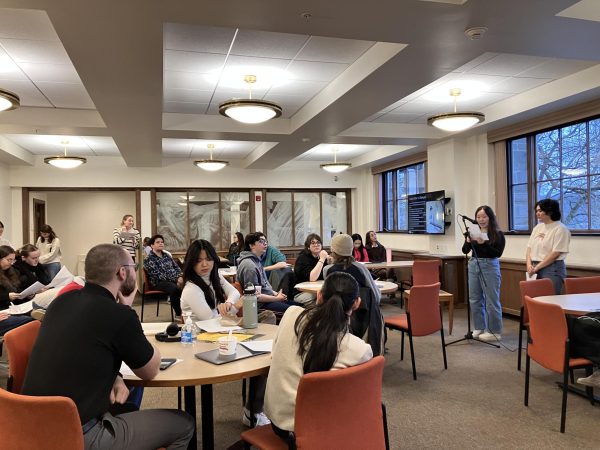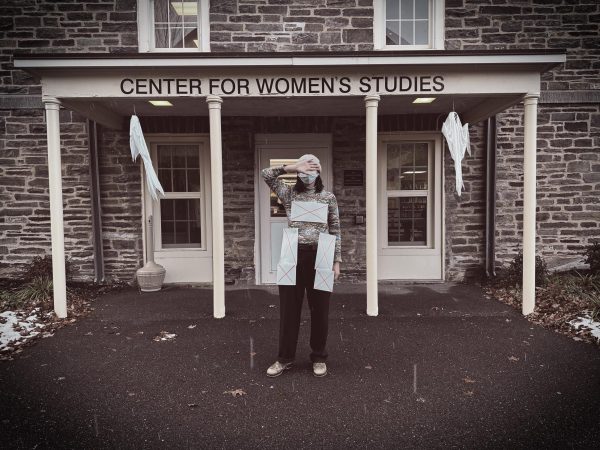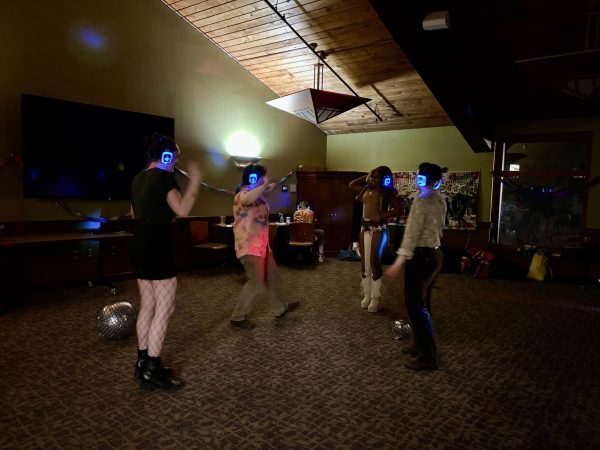Ta’Von Amir: Revolutionary Acts of Self
In an environment dominated by academic measures of worth, the first step in sophomore Ta’Von Amir’s path to fulfillment was reclaiming their individualism in order to pronounce their humanity. Amir, whose friends refer to them as “Tay,” exemplifies someone whose role as a student is not a limitation. Beyond their commitments as a founder and manager of Pink Haus — a Queer belonging interest house on Broad Street — and the Co-President of the social-support group Queer and Trans People of Color (QTPOC), Amir is a multimedia artist interested in film and song.
Amir’s 2021 collaborative short film, “Diary of a Shooting Star,” is available on YouTube. With the directorial guidance of filmmaker Juni Ricks, Amir’s writing takes form. The short film features a constellation of deep-cutting music which backs several verses of poetry, each exploring the topics of Queer, Black personhood and mental health. Amir’s writing is both raw and sharp, tinted with a desperate search for answers to life’s biggest questions. The protagonist and sole actor, Anthony Moore, curls into himself during a shaking soliloquy of Amir’s writing.
“Little caterpillar, how do I do it? From where do you learn of the moon, the seasons… tell me why humans choose to confine themselves. Tell me why clothes and colors equate to someone’s identity more than how they feel.”
Amir’s poetry both ponders and resents; it agonizes and heals. Their collections often undertake the artistic aim of putting feelings into words — the consequent imagery translates abstract ideas into shared experiences. In the poem, “Black Skin Turn Blue in the Moonlight,” Amir creates a tangible archetype of their depression, as it scatters around their everyday environments.
“My depression is a glass house, / the empty plates on my desk, / the unfolded laundry in my bed, / the litter box I want to clean, / my head / down, eyes /closed in the classroom. / It is a great gray beast, / a blue-green aphid / in a garden only I know — / except I haven’t seen that garden in years.”
To Amir, fulfillment on Colgate’s campus is central to a seemingly simple but altogether revolutionary adherence to individualism. When I met Amir, I asked them about their plans for the coming evening; they replied that, at no particular time, they wished to dance in the grassy lawn surrounding the Pink Haus. If you become colloquial with Amir, they will ask you in passing if you’ve done something for yourself that day, or if you have eaten, rather than a simple “How are you?”. Amir’s personable demeanor is indicative of the humanity they focus on preserving.
One philosophy that shapes Amir’s character is the recognition of an “inner child,” or the idea that in all of us lives our youthful selves. In retrospect, taking care of ourselves means taking care of that child, especially those who have been aged by trauma. In their residence, Amir keeps a picture of their younger self as a reminder to take care of them.
“I keep this up, and keep it with me, to know what I’m living and breathing for every day,” Amir said. “That little child went through a lot. I’m giving that child in me the space and a chance to just be.”
Amir discussed the nourishment of one’s inner child through simple, traditionally child-like tasks that allow the brain to disconnect and disarm.
“Just doing simple things, like blowing bubbles or coloring a page, it’s just like ‘I can breathe.’ In these moments I can be, and nothing needs to get done. Nothing is knocking on my door demanding something from me or taking something from me. I’m just coloring in some lines,” they said, laughing.
Another medium for connecting to one’s inner child is style. Amir commented about how children are often robbed of the autonomy to pick their clothing, and that this subsequently threatens their individualism. Because of this, Amir often dresses for their younger self.
“For me, style has been experimenting with [the idea] if my inner child could have picked what I was wearing today, what would I wear? What am I going to wear today that makes me feel more me? It’s almost more than expression; in a way, it’s reclamation.”
In the future, Amir foresees releasing music that includes visual features and attending USC’s film school. In the meantime, they will continue to be.





